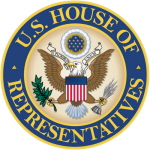Bachmann, Kline, and Paulsen Respond to U.S. House Health Care Bill Passage

The three GOPers were joined by Blue Dog Democrat Collin Peterson in voting against the bill, along with 33 other Democratic members of the U.S. House.
Of the remaining four DFLers from the Gopher State that voted for its passage, two announced their intention to support the bill on Saturday: Jim Oberstar (MN-08) and Tim Walz (MN-01).
After Sunday evening’s vote, Representatives Bachmann, Kline, and Paulsen were quick to reiterate their opposition to the legislation:
Kline characterized the vote as a failure by Congress to listen to the American people, but vowed to continue the fight to “undo the government takeover of health care.”
Freshman Congressman Paulsen echoed Kline by calling it a “partisan bill the American people have said loud and clear they do not want” and that the burden of increased costs the massive government expansion will bring to future generations is “both reckless and wrong.”
Congresswoman Bachmann, who has been at the forefront of the GOP caucus in opposing this bill, warned, “Future generations will pay the price for our government’s arrogance and recklessness,” and vowed that the “fight for the soul of this nation continues on.”
Here are the Representatives’ full statements:
Michele Bachmann (MN-06)

“‘Our country is too large to have all its affairs directed by a single government. Public servants at such a distance, and from under the eye of their constituents, must, from the circumstance of distance, be unable to administer and overlook all the details necessary for the good government of the citizens, and the same circumstance, by rendering detection impossible to their constituents, will invite the public agents to corruption, plunder and waste. And I do verily believe, that if the principle were to prevail, of a common law being in force in the United States…, it would become the most corrupt government on the earth…What an augmentation of the field for jobbing, speculation, plundering, office-building, and office-hunting would be produced by an assumption of all the State powers into the hands of the General Government.’
“Poignant words, and as our federal government expands its grip over one-sixth of our nation’s economy with the passing of this legislation, maybe now President Obama and Speaker Pelosi will finally take the time to find out what’s in it.
“This past year, the President and Democratic leaders in Congress gathered in back rooms away from the American people and twisted arms to get just enough votes through deals and handouts to pass their legislation. They broke promises of open debate and transparency, and instead of working with Republicans and implementing common sense reforms that wouldn’t break the bank, they went it alone and spent more money we just don’t have.
“Future generations will pay the price for our government’s arrogance and recklessness, and the American people won’t ever forget the irresponsible actions of this Administration and Congress. After all, government answers to the people, not the other way around, and the fight for the soul of this nation continues on.”
John Kline (MN-02)

“Time and time again, Republicans called on the majority to scrap this government takeover of health care and student lending and embrace commonsense, bipartisan reforms. And each time, majority leadership rejected our offers and stubbornly insisted on their own partisan plan. Today will go down in history as a day when the balance of power shifted away from the people and their voices were silenced. The American people will not forget the way these votes were cast.
“Today’s votes were a loss for the American people, but the battle is far from over. We must now begin working to undo the government takeover of health care and replace it with meaningful reforms that will finally bring down health care costs.”
Erik Paulsen (MN-03)

This bill represents a major expansion of the federal government’s role in health care. It creates new entitlement spending of nearly $1 trillion, slashes over $500 billion from Medicare in order to spend it elsewhere, allows the IRS to impose new fines on Americans who don’t purchase ‘acceptable’ coverage, fails to protect veterans’ care and imposes a new $20 billion tax on life-saving medical technology innovations.
Amazingly, this bill also does not adequately address the fundamental problem of rising health care costs for individuals, families and small businesses. Instead, premiums are likely to continue rising under this plan, while new taxes and penalties will make it even harder for small businesses to create jobs. This is the exact wrong approach.
There is no question we can and should reform health care. But doing so with a massive government expansion that will burden future generations – all without fundamentally addressing the number one problem of rising costs – is both reckless and wrong. The American people need and deserve better.”
Follow Smart Politics on Twitter.

The rhetoric- both positive and negative- about the health care legislation will range from the poignant to the questionable to the ridiculous in the coming days. In truth this bill and the year long drama culminating in its passage reflects the climate of politics and the difficulties in which the country finds itself.
This legislation at best offers provisions to make health insurance more affordable- which for many (not all) will also make getting treatment and care both possible and financially viable. It will also put some (but not tremendous) amounts of regulation on insurance companies around practices that are financially abusive and contrary to ‘duty of care’ both in a medical sense and to traditionally-held expectations of a responsible provider-customer relationship. There is no guarantee that this will significantly reduce the overall cost to health care. However it should help to ensure that those costs do not just benefit the “upper 1%” of the country and that individual consumers may save money on their health if they are able to afford early diagnostic and preventative interventions before a health condition worsens becoming life threatening and financially impossible to receive treatment. The bill also provides significant opportunity for pilot programs across the country which will inform and create helpful learning opportunities around ‘best practice’ and improved provision of health care. Similar learning initiatives also happened in America’s agricultural reforms in the post dustbowl years of the 1930’s to great benefit of the country later in the 50’s, 60’s and 70’s and has continually ensured an agricultural surplus that we enjoy today not just for domestic consumption but also as a staple for international relief efforts abroad. In short, there are a number of things to be optimistic about.
Some will understandably be unhappy at tax increases and some will understandably dislike being told that they have to get health insurance. The good, bad or neutral outcomes of this are yet to be realised. However, it will be these issues that play most strongly in the rhetoric among politicians, the media and in everyone’s conversations…particularly against the back-drop of the country’s current problems. The discontent has its roots at common divides in American culture, specifically- the role of the state and the power of the individual. These are entrenched tensions found at the heart of nearly every issue facing local and federal government, private and public sector partnerships and neighbourhood/community projects. These are tensions that simultaneously undermine and perpetuate our country’s success. Thankfully our legislative process is by nature lengthy, cumbersome and awkward; forcing compromise, negotiation and bi-partisan work at the drafting process of bills. Cynnically the power of corporate wealth has altered the DNA of this process and (depending on what one hopes for and how something is delivered) plays for gain or loss in legislation but not without a corrosive effect on members on legislators and democratic discourse.
These tensions also dominate the powerplays, media scuffles and character-bashing that makes politics both engaging and unpleasant. In terms of the current bill, politicians will use age-old dichotomies of individual vs.state to play on our sense of what is happening; what is going right and what is going wrong. Many democrats will hail this as a historic achievement…which it may be…but, we haven’t seen the outcomes yet and won’t for a very long time. To celebrate a political victory is understandable but a great endeavour has yet to be achieved (ie: effective implementation) to celebrate a national one. Many republicans will treat this as an erosion of liberty and descent into “socialism.” It’s hardly that. The bill does not have enough teeth and the infrastructure inherent to federal, state and local politics enables far greater participation and decision-making by the public than one would find in traditionally socialist countries or in the mixed economies of European democracies. Bachman finds a great reference from Thomas Jefferson on the limitations of the state and potential for corruption…but is mis-representing it for her own gain. If the public is smart, we’ll save the rhetoric for amusing anecdotes over ‘tea or coffee’ and make decisions over the achievement of credible outcomes.
Well said by Joe. I would add only that the tensions are, in recent years, exacerbated by media personalities, mostly from the right, who can be, and often are, completely irresponsible. They have the “bully pulpit,” but they also have no responsibility for the welfare of the public, and their rhetoric, while profitable for the companies that own the relevant media outlets, is often – to be charitable – false, and does nothing to advance public understanding of the policy issues at stake.
It’s difficult to argue rationally with someone whose primary rhetorical device is name-calling. Being new to Minnesota, I’ve not yet seen enough of its Congressional representatives to form judgments about them all, but Ms. Bachmann’s persistent hysteria will earn her no credibility in this household. When she and her colleagues insist that the public has said ‘loud and clear’ that it does not want the program voted on by the House, they’re exercising the same sort of “selective hearing” that is practiced by many a teenager throughout the adolescent years.
This particular member of the public wishes the bill went even farther – I’m very much in favor of a “public option” that would put real pressure on insurance companies – but democracy, as joe has said above, is basically lengthy, cumbersome and awkward, with compromise a part of how it works, so I’m willing, for the time being, to settle for part of the loaf rather than nothing at all.
In essence it pays to be VERY suspicious of any claim that such-and-such a policy or law represents either extreme of tyranny or freedom. It’s virtually never a choice as easy and simple as that, which is why there’s always plenty of debate. Every law represents a compromise between freedom without limits – wherein no organized society is possible – and no freedom at all – a state which has never existed, though some very repressive authoritarian regimes have done their best to achieve it over the centuries.
There’s plenty of evidence, if it’s facts you’d like instead of ideology, that our health care system is inordinately expensive, rations health care by wealth, perhaps the least equitable way to ration anything, and doesn’t produce outcomes commensurate with what we spend on it as a society. Whether it’s adult life span, infant mortality, or a host of other generally-accepted measures of public health, the U.S. ranks, more often than not, in the middle of the pack. The one area where we rank far above virtually every other developed nation on the planet is how much we spend per capita to get these middling public health results. This new law has plenty of flaws, but it’s a start.
For the most part, Republican – particularly far-right-leaning Republican – opposition to health care reform has revealed the G.O.P. to be, as James Howard Kunstler has phrased it, “The Party of Cruelty.” But simply pointing a finger at Republicans does nothing to advance the welfare of the public. I think joe is on the mark by suggesting that we ought to wait and see how the new policies and procedures work. As a society, we have a history of pragmatism, and if the health care policies the Democrats have manufactured in Congress this year don”t work, I expect we’ll go back and look at the issue(s) and the remedy (ies) again to find something that performs better.
The purely political interpretation is that the Republicans had better find more to run on next fall than simply being opposed to health care. I used the phrase “health care” deliberately because everyone likes health and everyone likes care, and that’s how the Democrats will phrase and frame the argument. There are some Republican congressional challengers who are all fired up to do battle against socialized medicine next fall, but they will find themselves on a one-trick pony tilting at windmills.
There are undoubtedly lots of good arguments against this bill, but no one has read its thousands of pages of mind-numbing bureaucratese, and the arguments that can be made at this point are either too wonkish or two hypothetical to get many people fired up. The fact is, by next fall it will be very much yesterday’s news. Nothing particularly good or bad that anyone can see in their personal life will have come of it by then. I’m not saying that Republican challengers should start saying they like health care after all. In fact they’re pretty much required and expected to be a against it. However if they think that merely being against health care will sweep them to victory, they will get a rude awakening. They will have to campaign, as Scott Brown did, on a wide range of issues and with pragmatic positions on them. Furthermore, they will actually have to be good honorable people who are also good campaigners. “I’m a Republican and I’m against health care” is not a winning stump speech.